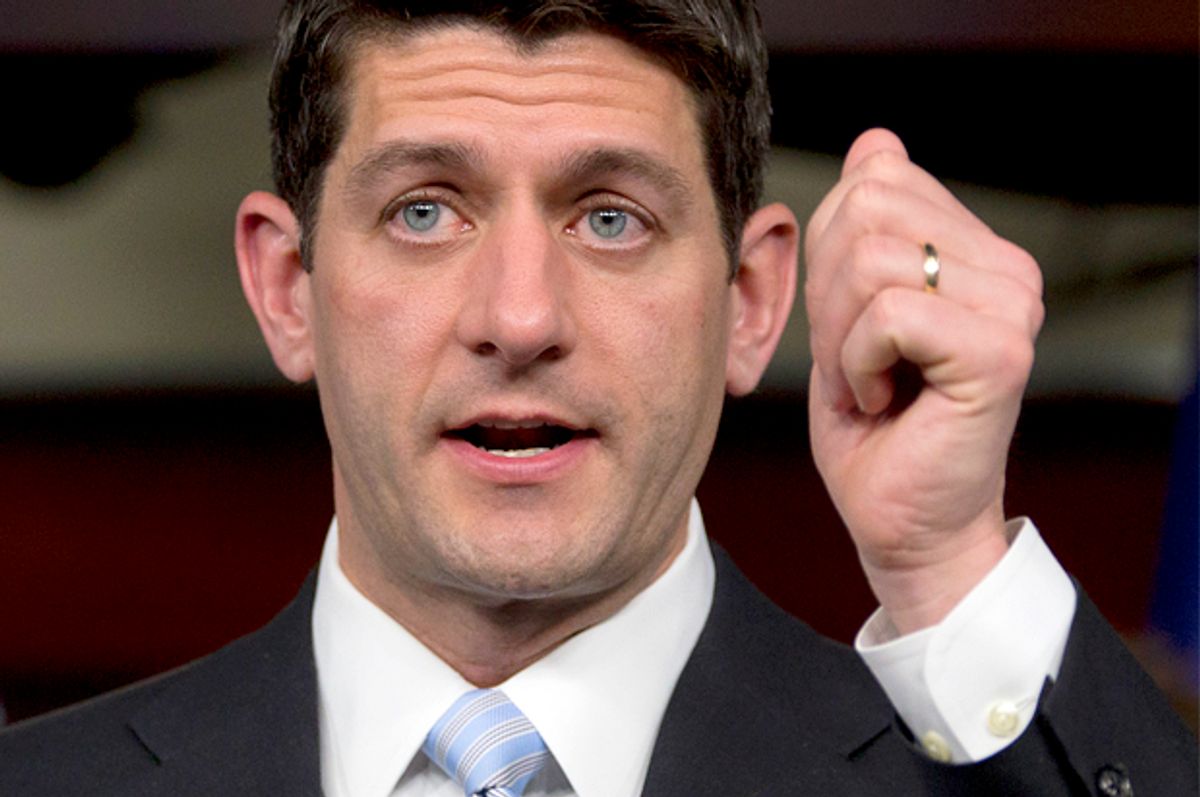Congratulations to new House Budget Committee chairman Rep. Tom Price on getting his first budget resolution out! It's non-binding and may make Senate Republicans squeamish, but it is... a document, that includes stuff.
And what it includes is more or less the same stuff that the last several budgets authored by former Budget chair Rep. Paul Ryan included.
That means:
• It "partially privatizes" Medicare by turning the current, popular single-payer system into one where coupons are handed out to old people to try their luck on the glorious free market. And who doesn't look forward to spending their Golden Years shopping for private health insurance plans with coupons that erode in value as they fail to keep up with medical inflation? As usual, this won't kick in for another ten years, because current old people vote Republican and want the government's hands off their Medicare!
• It cuts the shit out of Medicaid and then block-grants the five bucks or so that remain to the states for governors to spend on tax cuts or new college football stadiums. The budget "envisions" doing the same to the Children's Health Insurance Program and SNAP benefits, because obviously.
• It repeals Obamacare and replaces Obamacare with a plan called "nothing." (It does include the typical language asking committees to come up with something replacement-y. It demands a "patient-centered" approach, which means whatever anyone wants it to mean.) Just to keep score on the healthcare stuff here: Give future old people some coupons, give poor people nothing, and then take away Obamacare so that poor people and slightly less poor people have even more nothing.
• The FY 2016 numbers do adhere to 2011 Budget Control Act caps on discretionary spending. But whereas people who, say, can't get Pell grants anymore won't have some magical mystery fund to turn to, Price does kick in a healthy $94 billion to the emergency, off-budget "overseas contingency operations" fund -- approximately $40 billion more in warmaking monies than President Obama requested. The long-term plan, anyway, is to obliterate the non-defense side of the discretionary budget and pump up the defense side. "Over the next decade," The Hill writes, "the blueprint proposes raising defense spending by a total of $387 billion and cutting non-defense spending by $759 billion."
• It guts Dodd-Frank, obvs.
• It employs Paul Ryan's beloved dynamic scoring to pretend that these changes will grow the economy and thus federal tax receipts. The idea is that once you've beaten poor people into the ground as much as possible, the economy will flourish. This modeling helps Price arrive at a balanced budget in less than a decade.
• It will include reconciliation instructions. Without getting too technical, this provides the Senate its one chance to get legislation to the president's desk without fear of a Democratic filibuster. Price's resolution suggests that he'll hold a contest to determine what legislation wins the golden ticket, "[charging] 13 of 21 House committees with producing reconciliation bills that would reduce the deficit over the next decade." The smart idea would be to use reconciliation to pass a somewhat more conservative version of legislation that the president wants, like corporate tax reform, thus applying pressure on him to sign it. The not-smart idea would be to use this silver bullet on something the president would instantly veto, like, say a repeal of the Affordable Care Act. So naturally conservatives in Congress and in outside pressure groups will push for the Republican leadership to waste its reconciliation bill on a repeal of the Affordable Care Act.
All told, this is basically the same as the Ryan budgets: couponizing Medicare, slash-and-block-granting Medicaid and other things that help poor people and their poor children, slashing non-defense discretionary funding to historic lows, boosting defense spending in the long-term while throwing a bunch of short-term cash into the off-books warmaking fund, repealing Obamacare and much of Dodd-Frank, and sprinkling in a little dynamic-scoring action on the revenue side to get the budget balanced.
The Senate Budget Committee's resolution is expected to be released tomorrow. It may be a touch less draconian since several blue-state Republicans will be up for reelection this cycle. Assuming each resolution passes its respective chamber, the two budget committee chairs will go to conference to hash out a compromise report. It will be a minor miracle if House and Senate Republicans, who will have approximately zero Democratic votes to work with, can get a conference report passed through both chambers.

Shares